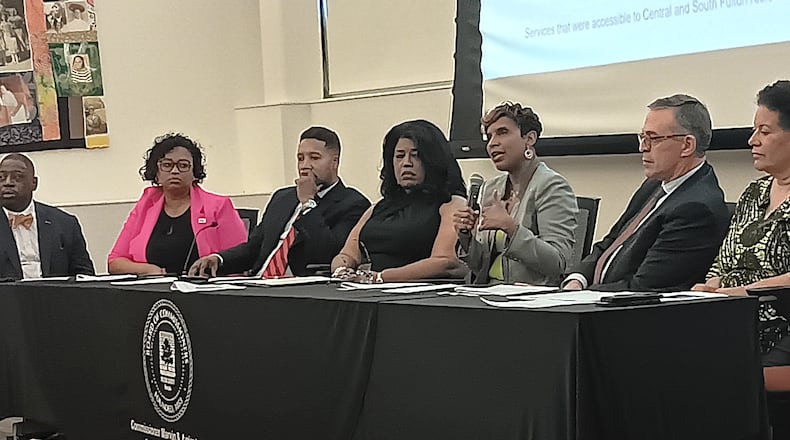Good — but not nearly enough, or soon enough.
That was the general verdict Thursday night on Grady Health System’s plan to open a standalone emergency room in Union City during 2026.
“It’s a good start,” said Robert Weaver, who recently moved to Fairburn. Officials need to look at getting specialized medical care into the area as soon as possible, he said after the gathering.
“The ‘urgent care’ is a nice Band-Aid, but it’s not a long-term solution,” Weaver said.
Dozens packed a community room at the Wolf Creek Library in South Fulton for a town hall hosted by Fulton County Commissioner Marvin Arrington Jr. on health care inequalities for county residents south of Interstate 20. The crowd got raucous as people recounted their dissatisfaction with available health care in the county’s south end, especially in the wake of the 2022 closing of the only two hospitals in that area.
In 2022, Wellstar Health System closed Atlanta Medical Center in the city of Atlanta and its associated East Point hospital, saying they were not financially viable.
On Thursday night, accusations flew of general indifference from hospital operators and government, with complaints about long treks to seek care in north Fulton or elsewhere, and the difficulty of getting transportation when care is needed.
Broderick Smith said he and his family recently moved to South Fulton from Washington, D.C. The Smiths got up at 7 a.m. Thursday to take their 9-month-old son to an allergist in Kennesaw, where they were directed to several other sites for more tests and a blood sample, he said. Their round trip of roughly 100 miles ended shortly before the 6 p.m. town hall.
With specialized care a long drive from south Fulton County, Smith wondered how his son could be treated for a food allergy reaction in the two years before Grady’s ER is built.
“What happens, and where are we going to go?” he said.
Many people demanded a full-service hospital for the area. Several identified themselves as current or former health workers, and said they’re working on local health advocacy or providing care in the area themselves.
One was Marsha Ford, a certified nurse midwife, who said she is working with consultant Jacinta Daniel and fellow certified nurse midwife Lynette Allen-Pye on soon opening Genesis Birth Concepts in East Point.
With Allen-Pye as its CEO, it will be the first African American-owned midwifery birth center in the Atlanta area, according to its LinkedIn page. Daniel said Genesis Birth Concepts is an all-local initiative, opening without government funding.
Ford, of East Point, said she only heard about the new ER at Thursday’s town hall but was dubious.
“Two years is a long time,” she said.
Instead Ford urged renovating the existing closed hospital in East Point, or rebuilding on the same site.
“It’s going to be a transportation issue, going down to Union City,” she said. Buses conveniently stopped at the former Wellstar hospital in East Point, and it was convenient to Interstate 85, Ford said.
The eight cities in Fulton County south of Atlanta are home to more than 200,000 people, with about half in South Fulton itself. Arrington said the south half of the county is not just a desert for all forms of health care, but particularly for emergency care. People can schedule lengthy trips to regular appointments but emergency care has to be nearby, he said.
“There are five hospitals in north Fulton. We’re not going to stop until we have five here too,” Arrington said.
Panelists at the town hall included officials from Grady, the county and cities in south Fulton.
Pamela Roshell, county chief operating officer, said the hospital closures also shut down a “network of care” — related services that are crucial for overall health. A county study found that life expectancy in central and south Fulton County is five years less than in north Fulton, which has multiple hospitals and a wealth of associated health services, she said.
The closures in south Fulton also drove up emergency room waiting times at hospitals in the surrounding area, Roshell said.
Fulton County and Grady have several initiatives underway to improve things, she said: Grady is opening two primary care clinics, Morehouse School of Medicine has opened a clinic in East Point with county financial support, and the county itself is shifting and expanding health service offerings in its own facilities such as senior centers.
The county has a free smartphone app called Fulton Cares, launched in 2022, that connects users to all public health services, provides event updates and even answers questions, Roshell said.
South Fulton Councilwoman Helen Willis and East Point Councilman Joshua Butler disagreed on whether area cities should open a hospital on their own. Butler proposed forming a public hospital authority, saying a 100-bed hospital could be built with a $200 million bond issue.
“Look at what we did for the Falcons,” he said. Area taxpayers put $200 million into building Mercedes-Benz Stadium, out of a total $1.6 billion cost.
An additional $50 million would renovate the former Wellstar hospital in East Point, Butler said.
Willis countered that a hospital authority could own the land and building, but wouldn’t actually operate the hospital. And $250 million for construction and renovation would provide nothing for staffing or ongoing operating costs, she said.
Willis asked panelist John Haupert, Grady CEO, how much it costs to run Grady Memorial each year. Two billion dollars — “but Grady is a monster hospital,” he replied.
The standalone ER site is 40 acres next to the county’s new Elections Hub & Emergency Operations Center on Campbellton Fairburn Road, about six miles south of the town hall at Wolf Creek Library.
The site is bigger than currently needed. Grady wants to expand services, perhaps even building a full hospital — but for now that’s just not financially sustainable, Haupert said.
“Medicaid expansion makes all the difference,” he said.
Multiple panelists stressed that Georgia accepting federal Medicaid expansion would make an enormous difference, providing millions of dollars to make health services in poorer areas viable.
Late in the legislative session that ended March 28, Georgia Republicans killed a last-minute attempt to accept Medicaid expansion with a deadlocked committee vote. Some Republicans supported the Democratic measure, but other Republicans said they wanted to give Gov. Brian Kemp more time with an alternative program he launched last year. As of March, Kemp’s “Pathways to Coverage” program had only attracted about 3,500 enrollments out of an estimated 370,000 eligible.
The federal waiver permitting Kemp’s program is due to expire in 2025. On Thursday, Kemp announced his opposition to expanding Medicaid next year.
About the Author
Keep Reading
The Latest
Featured


